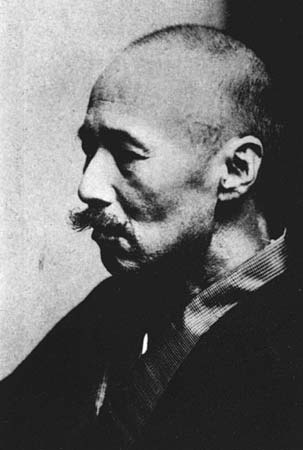Mori Ōgai
Japanese author
pseudonym of Mori Rintarō
born February 17, 1862, Tsuwano, Japan
died July 9, 1922, Tokyo
 one of the creators of modern Japanese literature.
one of the creators of modern Japanese literature.The son of a physician of the aristocratic warrior (samurai) class, Mori Ōgai studied medicine, at first in Tokyo and from 1884 to 1888 in Germany. In 1890 he published the story “Maihime” (“The Dancing Girl”), an account closely based on his own experience of an unhappy attachment between a German girl and a Japanese student in Berlin. It represented a marked departure from the impersonal fiction of preceding generations and initiated a vogue for autobiographical revelations among Japanese writers. Ōgai's most popular novel, Gan (1911–13; part translation: The Wild Goose), is the story of the undeclared love of a moneylender's mistress for a medical student who passes by her house each day. Ōgai also translated Hans Christian Andersen's autobiographical novel Improvisatoren.
In 1912 Ōgai was profoundly moved by the suicide of General Nogi Maresuke, following the death of the emperor Meiji, and he turned to historical fiction depicting the samurai code. The heroes of several works are warriors who, like General Nogi, commit suicide in order to follow their masters to the grave. Despite his early confessional writings, Ōgai came to share with his samurai heroes a reluctance to dwell on emotions. His detachment made his later works seem cold, but their strength and integrity were strikingly close to the samurai ideals he so admired.
- Lake Pend Oreille
- Lake Petén Itzá
- Lake Pielinen
- Lake Placid
- Lake poet
- Lake Pontchartrain
- Lake Poopó
- Lake Poyang
- Lake Prespa
- Lake Pukaki
- Lake Päijänne
- Lake Rotorua
- Lake Rudolf
- Lake Rukwa
- Lake Saimaa
- Lake Saint Clair
- Lake Scutari
- Lakes Entrance
- Lake Sevan
- Lake Siljan
- Lake Simcoe
- Lake, Simon
- Lake Superior
- Lake Superior Provincial Park
- Lake Tahoe